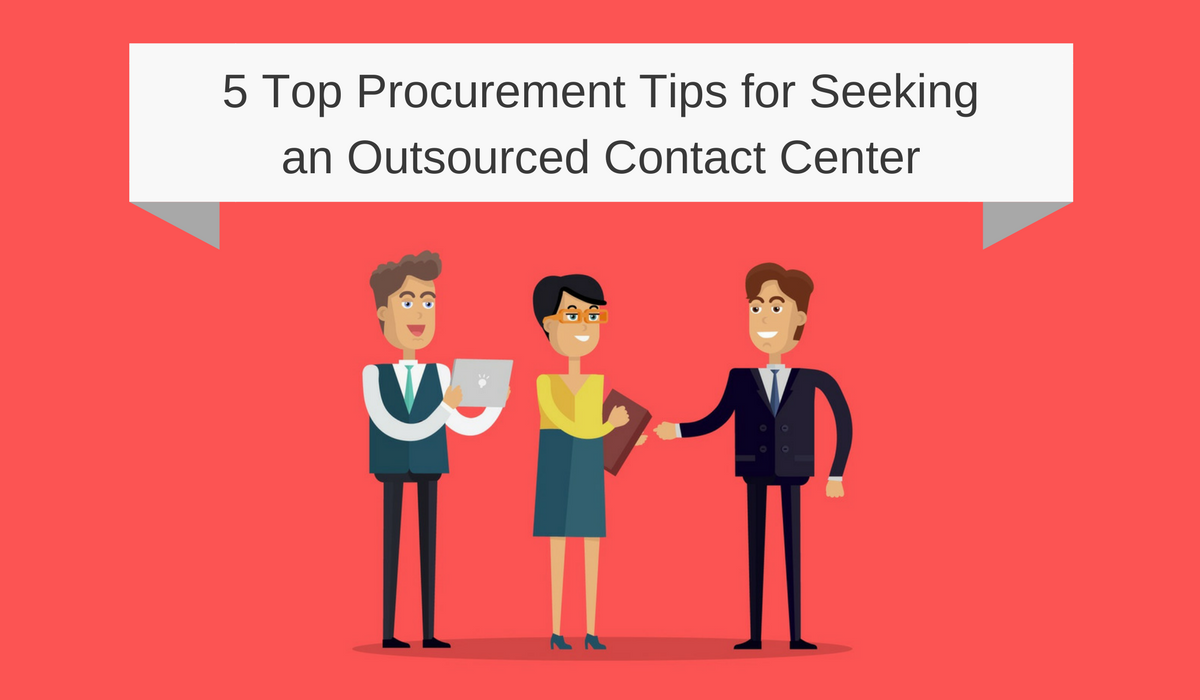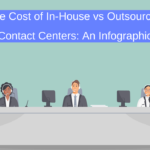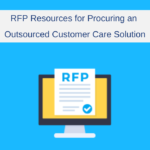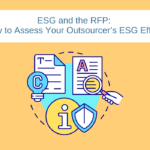5 Top Procurement Tips for Seeking an Outsourced Contact Center

Looking for an outsourced contact center partner is one of the most complex undertakings for any strategic sourcing professional. It requires a thorough understanding of the contact center world as well as the inner workings of your organization’s processes, business objectives, and brand promises. Finding the right contact center for you is going to take more than a strategic RFP. Here are our top procurement tips for seeking an outsourced contact center.
1. Start with the Basics
An internal assessment builds the foundation of your search. These might seem like basic questions, but they get everyone on the same page and on the right trajectory for the best fit partner. Make sure you’re asking, why are you looking for a new outsourced contact center in the first place? Are your current operations in-house and becoming a burden? Or is your current outsourcer falling short of your expectations? Where are there gaps in efficiency or effectiveness? Where do your current customer service efforts show weaknesses or blind spots? Are you able to scale? How are you measuring success? Are your processes fully optimized? What are your competitors doing in the customer service space? All these questions and more will help you set the stage for determining what an optimal solution actually looks like.
2. Nail Down Your Needs
When you have a thorough view of what your current customer service situation looks like, you can start gathering your specific requirements. This will aid you in communicating the scope of your project to a potential outsourcer. Make sure you document the details of your hours of operation, forecasted call volume (including peak seasons and times), what languages you’ll need supported, what digital channels you may need support in, and the breakdown between inbound and outbound calls. What skill sets will your agents need, and what technical integrations do you require? Furthermore, what are your expectations regarding KPIs and desired service levels? These are all critical factors to be aware of when seeking an outsourced contact center.
3. Ask the Right Questions
Both in the contact center RFP and in one-on-one discussions, it’s imperative to ask the right questions to make the most informed decisions. On the RFP side, ensure that the questions you ask are specific to the contact center sector, rather than replicated from a general RFP document used in other industries. Ask pointed questions about an outsourcer’s corporate culture, hiring process, and employee engagement practices. These are the areas where a contact center can truly differentiate itself or, conversely, fall disastrously short. Another common mistake is in asking questions that are too broad, particularly in the realm of metrics. For example, if you’re asking about attrition in the contact center, be sure to make the distinction between voluntary and involuntary attrition as well as asking about attrition rates in projects of similar scope and industry, and within a specified period of time. In short, ask the right questions, or you risk comparing apples to oranges and, as a result, making a flawed decision.
4. Look for Collaboration and Value
There’s no shortage of companies who choose a call center purely for cost-effectiveness. While there is a time and place for this business model, it doesn’t hold universal value. While we agree that cost-savings and efficiencies matter, you have to find a valuable balance between price and quality service. Contact center outsourcing means you’re trusting customer-facing interactions to people outside of your organization and corporate culture. This trust can only be found in a strategic, collaborative partnership that puts delivering value over cutting costs. You need to look for an outsourcer that focuses on assimilating its team of coaches and agents into your brand, understands the importance of the customer experience, and invests their time and resources into thorough reporting and reviews. In other words, look for commitment. If it’s not obvious in your discovery process, it probably won’t ever exist.
5. Get On-Site
Once you’ve nailed down a handful of contenders who made it through the RFP round, the next crucial step is to make a site visit. Getting the tour of a potential contact center partner will provide insight that no brochure, RFP, or phone call can deliver. It’s the kind of insight that will help you make the final decision with peace of mind. Here are a few things to keep in mind on your site visit. First, is there an agenda to your visit and how much of your input on that agenda did the contact center ask for. Second, does the work environment reflect the corporate culture they sold you in the sales and RFP processes? Is it welcoming and hospitable? Do agents appear engaged and motivated? Assess the body language of everyone you meet and evaluate how relaxed and spontaneous conversations are with employees and leaders. At the end of the day, can you picture yourself working with the people you’re meeting? Do you feel like you can trust them with your customers? Does their culture align with your own? Without this firsthand experience, it’s all too easy to miss important details about how a contact center functions and interacts.
Are You Seeking an Outsourced Contact Center?
We know that finding an outsourced contact center partner is complex. It’s a decision that must make sense for your company both today and for the future. Internal assessments, requirements gathering, smart questions, collaboration, and site visits are all part of the framework that will lead you to success. However, these procurement tips are just a small handful of ways in a sea of many to ensure you’re making the most informed, strategic decision. We’d love to chat more about your specific needs in the realm of customer service and other contact center services.
Looking for a strategic outsourced contact center partner? Start the conversation by clicking here.

![The 10 Most Important Contact Center RFP Questions [Infographic]](https://blueocean.ca/wp-content/uploads/2019/09/Blue-Ocean-Blog-9-10-19-150x150.png)


